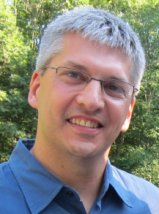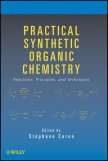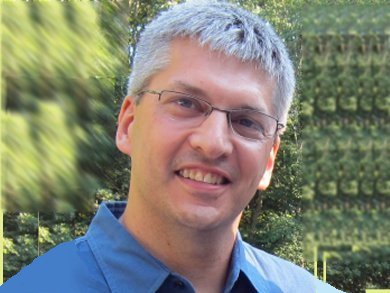Dr. Stéphane Caron is Director at Pfizer Global Research & Development Groton Laboratories, Connecticut, USA. He has over 15 years experience in the field of process chemistry and is the editor of the book Practical Synthetic Organic Chemistry: Reactions, Principles, and Techniques, which deals with ways to plan and carry out synthetic reactions in the laboratory and provides an insight into good synthetic route design.
He talks to Jonathan Rose for ChemViews magazine about how he became interested in process chemistry, the differences between academia and industry, and the challenges facing synthetic chemists.
What got you interested in organic chemistry?
I really liked how chemistry allows scientists to build things and be a molecular architect, and this was the reason I chose to go into the field in college. During my undergraduate studies at Université Laval in Québec City, Canada, I was trying to decide between polymer or synthetic organic chemistry and I was fortunate to work in a polymer lab for a summer. I loved synthesizing the monomers at the beginning of the project and conducting the polymerizations but did not enjoy the analytical and material characterization work that followed as much. I knew at that point that I loved synthetic organic chemistry. I worked in natural product synthesis for my Master’s and Ph.D. degrees.
What led to your current job at Pfizer?
While working on natural products synthesis, I wanted to understand reactions, optimize them and think in terms of better synthetic strategies. I interviewed for positions in both Medicinal and Process Chemistry, but I realized that I was probably more passionate about Process Chemistry.
What are the most common challenges a synthetic chemist faces?
For synthetic organic chemists, there is a tremendous wealth of knowledge that already exists. It is not always easy to find if what has been published previously is relevant to the problem faced at any given time. A lot of synthetic methodology exists, but it may not address questions of selectivity (chemo-, stereo- and regio-) that are relevant to your substrate. So the ability to confidently predict that a given transformation will work remains challenging.
Another challenge continues to be building complex molecular architecture efficiently. While we often have a number of options when thinking of a specific chemical transformation, it is much more difficult when thinking of a potential retrosynthesis. Computer-based retrosynthesis tools have not yet surpassed the ability of synthetic organic chemists to imagine better ways to construct molecules. As synthetic targets increase in complexity, the number of synthetic options grows dramatically and it becomes very difficult to identify and prioritize what the best approach will be. It is experimentally intensive and often risky to have a key innovative synthetic transformation late in a synthesis when you are not certain of its success.
Are there any differences between organic chemistry in an academic and industrial setting?
There are many differences between an academic and an industrial setting. I believe the biggest one is that in general in academia, students are asked to focus on a fundamental problem where they are expected to build the knowledge leading to a solution, often on their own. For organic chemistry, this frequently takes the form of developing a new synthetic methodology or devising a target-oriented synthesis (e.g., natural products). More recently, academic research focusing on developing a basic understanding of biological system using organic chemistry has emerged as a popular area. However, it is still conducted more as an individual effort.
Industrial research in the pharmaceutical industry is certainly more applied. Medicinal chemists have the clear objectives of understanding the structure–activity relationship of a biological target and identification of agents that have the necessary properties to trigger the desired biological response. Process chemists have to identify and develop syntheses for drug candidates and balance the desire for speed, quality, cost, environmental impact, regulatory acceptance and so on throughout the development cycle. In either case, organic chemists must provide their expertise but work in collaboration with experts from other disciplines such as biology, toxicology, analytical chemistry, and engineering, just to name a few. An industrial setting requires that organic chemists know what is expected of them, gain the trust of people from other disciplines and trust them just as much. Problems are approached through a cross-functional team.
Are there any tips you can offer someone looking to transition from student to professional?
Students about to graduate from academia and considering an industrial career have to demonstrate an ability to solve problems. Their biggest asset is the knowledge base they built through their education coupled with the intellectual capacity to evaluate a problem, build a hypothesis to solve it, create a plan on how to test the hypothesis and draw conclusions through analysis of the resulting data. In my opinion, the academic preparation is often more about developing these skills as opposed to what a student has specifically worked on in graduate school. However, in our rapidly changing world, demonstrating the ability to work collaboratively, to seek diverse points of view and to quickly adapt are becoming increasingly important.
You are Editor of the book Practical Synthetic Organic Chemistry. What motivated you to develop this book?
The idea for the book came from two different sources. The first one was that as a process chemist, other scientists would often come to me and ask for the preferred method for a given transformation. I recognized that there was a gap that might be addressed by a textbook providing a compilation of proven synthetic methods for known organic reactions in addition to some of the knowledge that process chemists build through experience.
The second was from a review that several Pfizer colleagues published on oxidations in the pharmaceutical industry.
As we prepared the manuscript, I came to the conclusion that while for several key transformations there are dozens of potential reagent combinations, only a few would be commonly utilized and are consistently reliable. As I talked to a few people about the concept of identifying preferred reaction conditions for a textbook, the feedback on the idea was very positive and we started working on this book.
What influence do you believe the book will have?
I am hopeful that scientists who need a good starting point on how to conduct a synthetic transformation will utilize the book as the source document and thereby increase their probability of success. I also believe that in doing so, it can provide assistance in identifying reaction conditions that will introduce elements important in process chemistry such as the choice of reagent and solvents, selection of environmentally friendly conditions, and safety of a process.
How does your book fit into a wider scientific context?
The book can certainly fit a very broad range of scientists such as undergraduate and graduate students who want to learn about basic concepts of process chemistry to practicing synthetic organic chemists who require appropriate reference material for a desired synthetic transformation. Many textbooks discuss the mechanistic aspect of chemical reaction, but not many address how to differentiate between literature precedents and identify the most likely to succeed.
How do you think of topics for books?
If I think of a topic that I have an interest in and realize there is nothing available to teach me, I then consider putting a book together.
Can you tell us about your own research?
I am still fascinated by synthetic strategy and how to construct molecular targets as efficiently as possible. I have been focusing on understanding efficiency not just in terms of step count or yields, but rather in understanding the total cost of a synthesis from raw materials and reagents, unit operations, and waste management. This leads to the development of better synthetic methods as one begins observing trends of which transformations are always more costly.
Where do you see the field of organic chemistry heading?
Organic chemistry will continue to evolve. A lot of the opportunities will arise from the intersection of chemistry with other disciplines such as molecular biology and engineering. Development of novel synthetic methods using enzyme evolution is changing the way people think of biocatalytic reactions. Fundamental understanding of reactions is also evolving through collaboration of chemists with engineers, physical chemists, and materials scientists. Analytical tools are improving such that data observed through non-intrusive methods coupled with understanding of the kinetics allows for the identification of multiple reaction pathways, leading to either optimization of a desired reaction or identification of new reactions. Finally, synthetic transformations will be judged through a standard other than yield or enantiomeric purity, for example, by using elements such as environmental impact, energy consumption and other parameters which will be better differentiators of overall synthetic efficiency.
Do you have any plans for your next book?
I do not have any new book plans at this point. After spending five years on “Practical Synthetic Organic Chemistry” I do not think I am ready to start another manuscript right now.
What are your interests outside of science?
Being a good parent. With two young kids growing rapidly, their interests rapidly become your own.
I also do enjoy gardening when I have the time and traveling.
Thank you very much for this interview!

Dr. Stéphane Caron studied chemistry at Université Laval, Québec, Canada, and gained his Ph.D. from the University of California, Berkeley, USA, in 1995. He joined Pfizer as a research scientist in the Pfizer Central Research, Process Research department in 1995 and was promoted to Senior Research Scientist in 1998. In 2000, he joined Pfizer Global Research & Development Groton Laboratories as a project leader. He progressed to Manager, then Associate Director, before moving to his current role as Director in 2005.
Selected Awards and Positions:
- Member of the Organic Process Research and Development Editorial advisory board, December 2007–present.
- Member of the Inorganic & Organic Chemistry Grant Selection Committee, Natural Sciences and Engineering Research Council of Canada, 2003–2006.
- Pfizer Fellowship, Department of Chemistry, University of California, Berkeley, August 1994–July 1995.
- Fonds FCAR Fellowship, Department of Chemistry, University of California, Berkeley, August 1991–July 1994.
- Fonds FCAR Fellowship, Department of Chemistry, Université Laval, Québec, May 1989–January 1991.
Selected Publications:
- Preparation and Utility of Trihaloethyl Imidates: Useful Reagents for the Synthesis of Amidines,
S. Caron, L. Wei, J. Douville, A. Ghosh,
J. Org. Chem. 2010, 75, 945–947.
DOI: 10.1021/jo902159z - Preparation of a Corticotropin-Releasing Factor Antagonist by Nucleophilic Aromatic Substitution and Copper-Mediated Ether Formation,
S. Caron, N. M. Do, J. E. Sieser, D. C. Whritenour, P. D. Hill,
Org. Process Res. Dev. 2009, 13, 324–330.
DOI: 10.1021/op800266x - Process Research and Development of an NK-1 Receptor Antagonist. Enantioselective Trifluoromethyl Addition to a Ketone in the Preparation of a Chiral Isochroman,
S. Caron, N. M. Do, J. E. Sieser, P. Arpin, E. Vazquez,
Org. Process Res. Dev. 2007, 11, 1015–1024.
DOI: 10.1021/op7001886 - Large-Scale Oxidations in the Pharmaceutical Industry,
S. Caron, R. W. Dugger, S. G. Ruggeri, J. A. Ragan, D. H. Ripin,
Chem. Rev. 2006, 106, 2943–2989.
DOI: 10.1021/cr040679f - The application of structure-based assessment to support safety and chemistry diligence to manage genotoxic impurities in active pharmaceutical ingredients during drug development,
K. L. Dobo, N. Greene, M. O. Cyr, S. Caron, W. W. Ku,
Regul. Toxicol. Pharmacol. 2006, 44, 282–293.
DOI: 10.1016/j.yrtph.2006.01.004 - Regioselective Synthesis of an Imidazo[4,5-c]pyridine through Selective Acylation of 3,4-Diaminopyridine: Synthesis of CP-885,316,
S. Caron, N. M. Do, R. E. McDermott, S. Bahmanyar,
Org. Process Res. Dev. 2006, 10, 257–261.
DOI: 10.1021/op0502250

Practical Synthetic Organic Chemistry: Reactions, Principles, and Techniques
Stéphane Caron (Editor)
John Wiley & Sons, New York, USA, 2011.
ISBN: 978-0-470-03733-1




